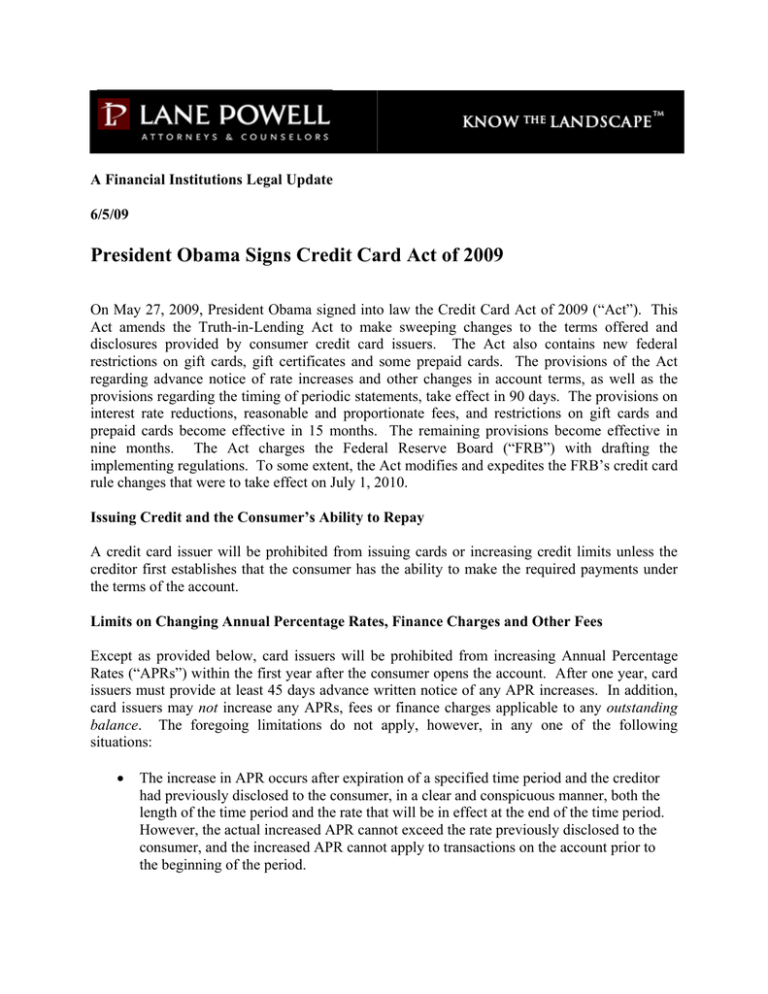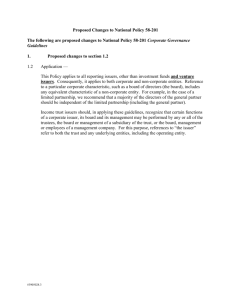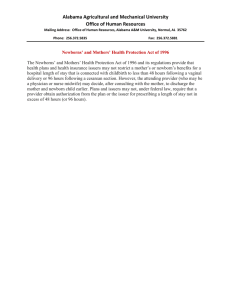President Obama Signs Credit Card Act of 2009
advertisement

A Financial Institutions Legal Update 6/5/09 President Obama Signs Credit Card Act of 2009 On May 27, 2009, President Obama signed into law the Credit Card Act of 2009 (“Act”). This Act amends the Truth-in-Lending Act to make sweeping changes to the terms offered and disclosures provided by consumer credit card issuers. The Act also contains new federal restrictions on gift cards, gift certificates and some prepaid cards. The provisions of the Act regarding advance notice of rate increases and other changes in account terms, as well as the provisions regarding the timing of periodic statements, take effect in 90 days. The provisions on interest rate reductions, reasonable and proportionate fees, and restrictions on gift cards and prepaid cards become effective in 15 months. The remaining provisions become effective in nine months. The Act charges the Federal Reserve Board (“FRB”) with drafting the implementing regulations. To some extent, the Act modifies and expedites the FRB’s credit card rule changes that were to take effect on July 1, 2010. Issuing Credit and the Consumer’s Ability to Repay A credit card issuer will be prohibited from issuing cards or increasing credit limits unless the creditor first establishes that the consumer has the ability to make the required payments under the terms of the account. Limits on Changing Annual Percentage Rates, Finance Charges and Other Fees Except as provided below, card issuers will be prohibited from increasing Annual Percentage Rates (“APRs”) within the first year after the consumer opens the account. After one year, card issuers must provide at least 45 days advance written notice of any APR increases. In addition, card issuers may not increase any APRs, fees or finance charges applicable to any outstanding balance. The foregoing limitations do not apply, however, in any one of the following situations: • The increase in APR occurs after expiration of a specified time period and the creditor had previously disclosed to the consumer, in a clear and conspicuous manner, both the length of the time period and the rate that will be in effect at the end of the time period. However, the actual increased APR cannot exceed the rate previously disclosed to the consumer, and the increased APR cannot apply to transactions on the account prior to the beginning of the period. • • • The increase in the APR is based on an index not in the control of the creditor and available to the public. (In other words, the credit card account is a variable rate plan). The increase is a result of the consumer’s failure to comply with a workout or temporary hardship arrangement. However, this exception is only applicable if the APR, fee or finance charge applicable to transactions after the temporary arrangement do not exceed the rates, fees or finance charges that were in effect prior to the arrangement, and the terms of the arrangement were disclosed to the consumer prior to the commencement of the arrangement. The consumer failed to pay the minimum payment within 60 days of the due date and the credit card issuer gives clear and conspicuous notice in writing to the consumer as to the reason for the increase. Additionally, the rate must be thereafter decreased if the consumer stays current for six months, and this must also be disclosed to the consumer at the time notice of the increase is given. Card issuers must also provide 45 days advance notice of other significant account changes. These notices must include notice of the consumer’s right to cancel the account prior to the effective date of the changes. In addition, the card issuer may not treat the cancellation as a default, may not impose a fee for cancellation and may not require the consumer to immediately repay the outstanding balance in full. Rather, the card issuer must allow the consumer to repay the balance through a method no less favorable to the consumer than: 1) amortizing the outstanding balance over at least 5 years, or 2) making minimum periodic principal payments based on a percentage of the outstanding balance that is not more than twice the percentage required before the effective date of the increase. Finally, if card issuers offer promotional interest rates, the rates must last at least six months. Limits on Fees and Interest Charges Generally, the amount of any penalty fee or charge for any omission or violation of the cardholder agreement (including any late payment or over-the-limit fee) will have to be reasonable and proportionate to the omission or violation. Additionally, the statute prohibits “double cycle billing.” Specifically, a card issuer may not impose finance charges for any balances for days in billing cycles that precede the most recent billing cycle or on any balances in the current cycle that were repaid within a free-ride period. However, these limitations do not apply to any adjustment to a finance charge that is a result of the resolution of a dispute or due to the return of a payment for insufficient funds. Card issuers will be prohibited from imposing over-the-limit fees unless the consumer has expressly elected to permit the creditor to complete transactions that will cause the consumer to exceed their credit limit. Also, the consumer must have been given notice of the amount of the fee that is to be imposed and notice of their right to revoke the election must be disclosed in the periodic statement. When they are imposed, over-the-limit fees may be charged only once during the billing cycle in which the limit was exceeded and only once in the next two subsequent billing cycles in which it remains exceeded, unless additional credit was obtained and the consumer again exceeded their credit limit. Further, card issuers may not impose a separate fee to allow a consumer to repay an extension of credit or finance charge unless the payment involves an expedited service by a service representative of the creditor. 2 3 Interest Rate Reduction If changes in market conditions and consumer creditworthiness, or other factors taken into consideration in determining interest rates, are used as bases to increase interest rates, the Act requires that changes in such factors also be taken into account in order to reduce interest rates. To assure this happens, card issuers must maintain reasonable methodologies for assessing these factors. At least once every six months, card issuers must review accounts in which APRs have been increased since January 1, 2009, and assess whether such factors have changed or the risk has declined. If so indicated by this review, the APR must be reduced. Advertising or Promoting Fixed Rates Creditors may no longer use the term “fixed” in conjunction with the terms “interest rate” or “APR” unless referring to an interest rate or APR that will not change or vary for any reason for the specified period. Crediting of Payments The Act establishes a number of new requirements for crediting payments to a consumer’s account. First, it requires that amounts paid in excess of the minimum payment be applied first to the card balance bearing the highest interest rate. In the case of card accounts carrying deferred interest rates, a creditor shall allocate the entire amount paid by the consumer in excess of the minimum payment to a balance on which interest was deferred during the last two billing cycles immediately preceding the expiration of the deferred interest period. If a creditor makes any changes to its process for handling consumer payments that cause a material delay in any payments made by the consumer during the 60 days following the change, the creditor may not impose a late fee or finance charge in connection with the payments. Further, the payment due date for a credit card account must be the same day each month, unless the day is a holiday or weekend. In that case, payments that are received the next business day may not be considered late. Payments received by 5 p.m., if in a readily identifiable form, must be credited to the cardholder’s account that day. Likewise, if a payment is made at a branch or office of a financial institution, the payment must be credited to the consumer’s account on that date. Periodic Statements and Disclosure of Credit Card Account Agreements The Act increases the duty of credit card issuers to disclose information to cardholders, and make those disclosures in a clear and conspicuous manner. First, card issuers must mail or deliver periodic statements at least 21 days prior to the payment due date or 21 days prior to the end of a free-ride period. In addition, each periodic statement must disclose the date on which a payment is due and, if different, the date after which a late fee will be imposed. In addition, the card issuer must disclose any penalty rate due to a late payment in close proximity to the payment due date. The statement must also include a minimum payment warning. The warning must state that paying only the minimum payment will increase the amount of interest the consumer will pay and the time it will take to repay the balance. The creditor must also disclose how much 4 time it would take for the consumer to pay the remaining balance if they make only the minimum payments, the total cost to the consumer of paying the balance in full when only minimum payments are made and the monthly payment amount that would be required to pay off the balance in 36 months. If the interest rate is set to change at any point, the change in interest rate must be taken into consideration in making the above disclosures. The billing statement must also include a toll-free telephone number at which the consumer may receive information about accessing credit counseling and debt management services. The credit card issuer must maintain an internet site that contains the written agreement between the creditor and consumer. These agreements must also be provided to the FRB in electronic format so that the FRB can make them available for public viewing. Issuance of Subprime or Fee Harvester Cards The Act limits the fees that can be debited to a consumer’s account. If a credit card issuer requires the payment of fees (other than any late fees, over-the-limit fees or fees for a payment returned for insufficient funds) by the consumer in the first year during which the account is opened in excess of 25 percent of the credit limit, no such fees may be deducted from the available credit under the terms of the account. Protection of Young Consumers The Act limits the issuance of credit cards to young persons, with a special emphasis on the protection of college students. The Act prohibits credit cards from being issued to consumers under the age of 21 unless they: 1) submit a written application that includes the signature of a co-signer who is 21 or older and has the means to repay the debts of the cardholder; or 2) provide financial information showing their independent ability to pay their debts. If an individual is jointly liable for the credit card of a consumer under the age of 21, the individual must agree in writing to joint liability for any extended credit. Any agreements colleges or universities have with a credit issuer for the purpose of marketing must be disclosed by the institution. Creditors must submit an annual report to the FRB containing the terms and conditions of all business, marketing, and promotional agreements and college affinity card agreements with or related to an institution of higher learning, and agreements with respect to any college student credit card issued to a college student at the institution. Moreover, credit card issuers will be subject to new restrictions on marketing credit cards on or near college campuses and making pre-screened offers to persons under age 21. 5 Gift Cards and Prepaid Cards The Act imposes new federal restrictions on store gift cards, gift certificates and general-use prepaid cards. Although each is defined broadly, the Act exempts from its coverage an electronic promise, plastic card or payment code or device that is: 1) used solely for telephone services; 2) re-loadable and not marketed or labeled as a gift card or gift certificate; 3) a loyalty, award or promotional gift card; 4) not marketed to the general public; 5) issued in paper form only (including tickets and events); 6) or redeemable solely for admission to events or venues at a particular location or group of affiliated locations (which may also include services or goods obtainable at the event or venue after admission or in conjunction with admission to such events or venues at specific locations affiliated with and in geographic proximity to the event or venue). The exact scope is unclear at best and it will, therefore, be left up to the FRB to determine the exact coverage of the new restrictions. The Act will prohibit issuers of covered gift cards, gift certificates and prepaid cards from imposing dormancy fees, inactivity charges or fees, or service fees with respect to gift certificates, store gift cards or general-use prepaid cards unless: 1) at least 12 months have passed with no activity; 2) not more than one charge is imposed per month; and 3) certain disclosures have been made prior to purchase of the card. These disclosures include a clear statement that fees will apply, the amount of the fees and the frequency of the fees. In addition, covered certificates and cards may not expire until at least five years after: 1) the purchase of the card or; 2) the last reload of funds. In addition, the expiration period must be disclosed in a clear and conspicuous manner. Advertising Free Credit Reports The Act requires that parties marketing free credit reports disclose in advertisements that free credit reports are available at “annualcreditreport.com.” The Act charges the Federal Trade Commission with writing the implementing regulations. Increased Civil Liability The Act also increases the caps on individual civil liability for violations of the open-end credit (not secured by a dwelling) provisions from a minimum of $200 to a minimum of $500 and a maximum of $2000 to a maximum of $5000. In addition, the Act allows for higher (unspecified) caps in the case of pattern or practice violations. For more information, please contact the Financial Institutions Law Industry Team at Lane Powell: 206.223.7000 Seattle 503.778.2100 Portland 360.754.6001 Olympia lanepowellpc@lanepowell.com www.lanepowell.com 6 We provide Financial Institutions Legal Update as a service to clients, colleagues and friends. It is intended to be a source of general information, not an opinion or legal advice on any specific situation, and does not create an attorney-client relationship with our readers. If you would like more information regarding whether we may assist you in any particular matter, please contact one of our lawyers, using care not to provide us any confidential information until we have notified you in writing that there are no conflicts of interest and that we have agreed to represent you on the specific matter that is the subject of your inquiry. Copyright © 2009 Lane Powell PC www.lanepowell.com Seattle - Portland - Anchorage - Olympia - Tacoma - London 7






